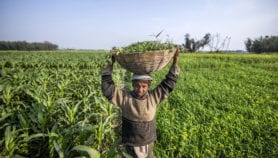By: Nicky Lewis
Send to a friend
The details you provide on this page will not be used to send unsolicited email, and will not be sold to a 3rd party. See privacy policy.
New research has found massive increases in the yields of genetically modified (GM) crops planted on farms in India, offering promise for the use of such crops in developing countries.
Field trial data taken from over 150 farms in southern and central India shows that yields for Bt cotton were over 80 per cent higher than non-GM or local hybrid cotton plants. And the GM crop also needed almost 70 per cent less pesticide, equivalent to a saving of US$0.30 per hectare.
Bt cotton — which has a gene that produces a toxin to kill the pest bollworm, and was commercially approved in India last year — is already known to dramatically reduce the need for pesticide. But until now crops engineered to be resistant to insect damage have not shown significant yield improvements (and in some cases have actually reduced yields).
The researchers are confident that the yield benefits demonstrated — which are reported in this week’s journal Science — are largely due to the Bt gene itself. They say that tropical conditions make it easier for pests, such as bollworm, to thrive and destroy crops. In India, crop damage losses from bollworm attacks average up to 60 per cent.
Another reason for the extra pest pressure is that poorer farmers are less likely to use chemicals to control pests — in contrast to those in the United States or China (where pesticides have been subsidised), for example.
These environmental, technical and economic factors make GM crops an extremely promising option for small-scaled farmers in developing countries, they say, with the largest yield gains expected in south and southeast Asia and sub-Saharan Africa.
“We are reporting on cotton, but the results are easily transferable to food crops since the type of pest damage they would sustain would be the same,” says lead author of the study Matin Qaim of the University of Bonn, Germany.
The researchers urge those that oppose the use of GM crops to consider the “mounting evidence” for benefits of such crops. And they call for balanced communication of the issues surrounding the technology.
“The bottom line is biotechnology has the potential to positively impact the lives of small, poor farmers in developing nations,” says co-author David Zilberman of the University of California, Berkeley, United States. “It would be a shame if anti-[GM] fears kept important technology away from those who stand to benefit the most from it.”
© SciDev.Net 2003
Photo credit: Monsanto













